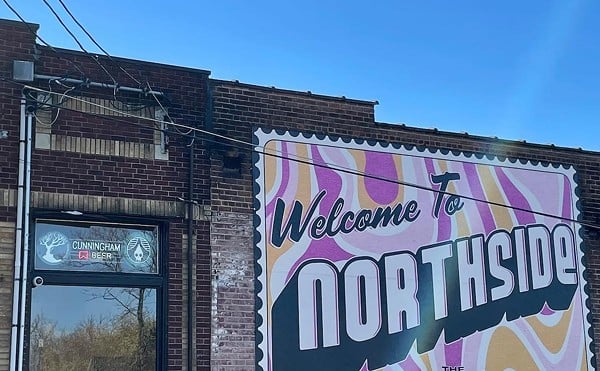|
It's almost frightening how quickly fortunes can change in the music industry. Whether it's chart position or label affiliation or simply who's hot at the moment, the "hero-today-who-are-you-tomorrow" syndrome is rampant.
Take Hem, for instance. The Brooklyn-based aggregation assembled more than five years ago around the concept of presenting a mix of antiqued Americana, gilded Country/Folk and stylized chamber music. It was clearly a good idea, as Hem captivated audiences in and around New York for months before the appearance of their self-released 2000 debut album, Rabbit Songs.
The rest of the country was equally enthralled by Hem's music — a combination of the songs and musical prowess of multi-instrumentalist Dan Messe and former Cincinnatian/guitarist Gary Mauer, and the mesmerizing power of vocalist Sally Ellyson — as a fair number of publications hailed Rabbit Songs as one of the year's best albums. And with that attention came the inevitable label interest and Hem's eventual 2003 signing with Dreamworks, a major label with a reputation for handling artists sensitively and with an eye toward development.
"Dreamworks was, in some ways, a dream label," says Messe. "They were truly artist friendly, and they really protected their artists. We were fortunate enough to have been signed by Lenny (Waronker), who was sort of the chief over there, and the only thing he told us was to keep doing what we were doing and keep exploring the road we were exploring.
They didn't ever put any pressure on us to make a hit or a single or change us in any way. We had total artistic freedom."
Before the ink was dry on Hem's contract, a plan was in place. Waronker wanted to re-release Rabbit Songs, which would keep the band on the media's radar while they returned to the studio to record the material that would ultimately comprise their sophomore album, last fall's Eveningland.
"He basically said, 'While we're re-releasing Rabbit Songs, you just go and create the album, and when you're ready for me to listen, I'll be here," says Messe. "There was no time pressure. It was just like, 'Here's the money, go do it.' We didn't need any excuse to go into the studio and spend a year, so that's exactly what we did."
After taking a month to lay down basic tracks, Messe and the band got a line on working with the Slovak Radio Orchestra through engineer Greg Kalbi and flew to Slovakia to record several orchestral arrangements with the group. The band's original concept for the album was to approximate the lush but streamlined sound of the '60s and '70s Countrypolitan movement, as embodied by Glen Campbell's "Wichita Lineman," Ray Charles' Modern Sounds in Country and Western, Brook Benton and, in some Pop respects, even The Carpenters. Everything was progressing nicely until the band was about two-thirds of the way through the album, when they discovered Universal had acquired Dreamworks and that the parent company would be dissolving their acquisition.
"We were in the studio, and our manager called us outside and told us the news," says Messe. "We had heard rumors. We read The Velvet Rope and all those Web sites and blogs so we had heard that Dreamworks was at the head of some deal-making going on. But everyone assured us that they were just rumors. I think the people at the label were taken by surprise that David Geffen dumped the label the way he did."
Fortunately for Hem, the label took the high road and returned the rights to Rabbit Songs as well as giving them full ownership of all the material they had recorded on Dreamworks' budget (Ultimately, Hem signed with Rounder for their distribution in an arrangement that is more partnership than label/artist relationship). The reality of the situation was that Hem had an incomplete album, no label affiliation and no money.
"When we heard we had no more money basically, we were like, 'We have to close ranks, and finish this album down and dirty in the next couple of weeks,' " says Messe. "And of course, we didn't finish the album for four more months, and we wound up going deeper into debt. It was such a rare gift that we'd been given that we had people's ears now and the thought of putting out something that we didn't truly love ... we just couldn't do it. What if this was the last album we would get to make?"
Wanting to create an album every bit as endearing as Rabbit Songs, Hem wrote a couple of new songs and re-recorded a couple of the old ones in pursuit of the sonic ideal (as well as Messe's lyrical theme of comfort and safety) that they had in mind. Feeling that some of the album had been overproduced initially, the band peeled away any unnecessary artifice to reveal the truest nature of the songs.
"It's a fine line when you're working with orchestras," says Messe. "You fall in love with parts and instruments and sounds, and it's easy to forget that it just gets in the way of the song. We just kept stripping away parts until we could just hear Sally and the emotion that was there."
The resulting work is an album of quiet beauty and exquisitely crafted serenity that perfectly reflects and translates the band's stated Countrypolitan and Pop influences. The focus of Hem's structure is Ellyson's incredible vocals, a sound that is simultaneously vulnerable and powerful, and a source of constant inspiration to Messe.
"She is the voice in my head now," says Messe. "I used to hear my own squeaky voice when I wrote, and I don't anymore. I hear her voice. And I know her voice so well I can write so I know where her sweet spots are. I know which words sound good in her voice and what notes sound good. It really shapes everything."
HEM performs Monday at the Southgate House with David Mead and Dawn Landes.





